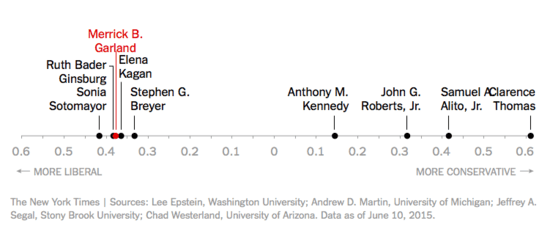The news around Supreme nominee Merrick Garland still bubbles. One GOP reaction to his nomination is: Him? Well, he's not too bad. Maybe we can squeeze his hearings and confirmation vote after the November election – if the Dems win the Senate. That way we can get this centrist on the court so that Hillary or Bernie can't nominate a liberal). That has GOP senators quite confused about how they should respond to questions from the press. Minority Leader Harry Reid blasted that idea. Do it now or don't bother.
Andrew Martin of the University of Michigan and Kevin Quinn of UC Berkeley School of Law have developed a judicial ideological rating. They searched through rulings of the sitting justices (I've seen it before with Scalia included) to come up with a score for each. Thomas is at 0.6 conservative, Alito above 0.4, Roberts above 0.3 and Kennedy around 0.15. The four progressives, Breyer, Kagan, Ginsberg, and Sotomayor, are clustered around 0.35 liberal.
Much to my surprise (and that of many progressives) Garland has been given a score right in the middle of the progressives. From the sources I read I was expecting a score somewhere around 0 or 0.1 liberal. But a score of 0.35 liberal means we would definitely have a progressive court.
On the way home from working at Dad's house yesterday I was listening to an NPR program talking about Garland and the unprecedented refusal by the GOP to even hold hearings. I won't link to the show because it's content wasn't of interest, but what it made be think about is.
Back in 2010 the Citizens United decision by the Supremes opened the floodgates of corporate spending in political campaigns. When that happened Keith Olbermann of MSNBC gave an impassioned editorial saying the only way to reverse that decision is a constitutional amendment (and good luck with that). Corporations would be in control of gov't and would not give it up. I had summarized Olbermann's main predictions back in 2010 and rephrase a few of them here:
* Legislators at all levels will be bought. Some will resist, but corporations don't have to buy all of them.
* Laws will be enacted to bust unions, the only other potential big source of campaign money (even though union dollars are no match for corporate dollars).
* Racial and religious tensions will be inflamed because somebody needs to be the scapegoat for the loss of the safety net and civil liberties and deflect the agitators away from corporations.
Sound familiar? One more:
* A future Supreme Court won't be able to overturn Citizens United because by the time enough appointments could make a difference those who could make or confirm the appointment will have been bought.
I'm fairly sure Obama is acting independent of corporations (though he is facing political reality). I'm quite sure that Senators McConnell, Grassley, and many others in the GOP have been bought. Their masters don't want an Obama appointment so they will do their part to make sure it doesn't happen.
Here's an interesting development. Bernie Sanders has said that if he wins the November election and if Garland isn't confirmed by then, he will ask Obama to withdraw Garland as the nominee so that Sanders can nominate someone else. Garland would be a fine justice and all that, but Bernie has one requirement for his nominees that Garland apparently doesn't fill: if approved for the high court will he or she overturn Citizens United?
Subscribe to:
Post Comments (Atom)

No comments:
Post a Comment